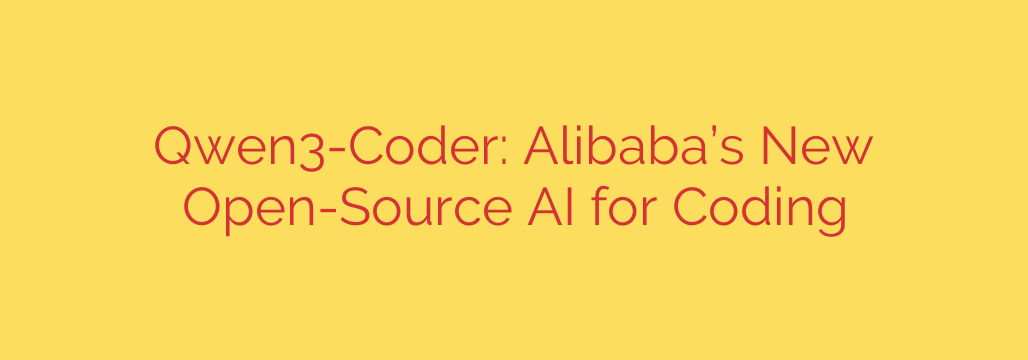
Qwen3-Coder: A New Powerhouse in AI-Assisted Coding
The world of software development is being reshaped by artificial intelligence, and a powerful new open-source model has just entered the arena. Meet Qwen3-Coder, a specialized large language model (LLM) designed to elevate the way developers write, debug, and manage code. This new tool isn’t just another update; it represents a significant leap forward in accessible, high-performance AI for the coding community.
As developers increasingly rely on AI assistants to streamline their workflows, Qwen3-Coder offers a compelling, robust, and transparent alternative to established proprietary systems. Its release marks a pivotal moment for open-source AI, promising to put cutting-edge capabilities directly into the hands of programmers, researchers, and businesses worldwide.
What Makes Qwen3-Coder Stand Out?
At its core, Qwen3-Coder is a family of models specifically fine-tuned for a wide range of coding tasks. Trained on a massive and diverse dataset of source code and technical documentation, it possesses a deep understanding of programming logic, syntax, and best practices across numerous languages.
Here are the key features that set it apart:
Exceptional Multi-Language Support: Qwen3-Coder is a true polyglot, demonstrating proficiency in over 80 programming and markup languages, including Python, Java, C++, JavaScript, TypeScript, SQL, and Go. This broad support ensures its utility across nearly any development stack.
Massive Context Window: One of its most impressive features is a 64,000-token context window. In practical terms, this allows the model to analyze and understand extremely large codebases, entire files, or complex project histories at once. This capability is crucial for tasks like comprehensive refactoring, deep bug analysis, and maintaining consistency across a project.
A Spectrum of Model Sizes: Recognizing that one size doesn’t fit all, the Qwen3-Coder series is available in various parameter sizes, from a nimble 0.5B model to a massive 34B powerhouse. This range allows developers to choose the right balance between performance and resource requirements, enabling deployment on everything from local machines to powerful cloud servers.
Advanced Coding Functions: This AI goes far beyond simple autocompletion. Its core competencies include:
- Intelligent Code Completion: Suggesting entire functions and code blocks.
- Bug Detection and Fixing: Identifying errors and proposing logical corrections.
- Code Conversion: Translating code from one programming language to another.
- Documentation Generation: Creating comments and documentation from existing code.
Performance and the Power of Open Source
Benchmarks show that Qwen3-Coder is a top contender, performing on par with or even exceeding the capabilities of leading proprietary models on several industry-standard tests. This level of performance from an open-source tool is a game-changer, democratizing access to state-of-the-art AI.
The open-source nature of Qwen3-Coder is perhaps its most significant advantage. By making the models (especially the smaller and mid-sized versions) freely available, it fosters a community of innovation. Developers can now:
- Customize and Fine-Tune: Adapt the model for specific, proprietary codebases or unique programming challenges.
- Enhance Security: Run the model locally or on private infrastructure, ensuring sensitive code never leaves a secure environment.
- Promote Transparency: Understand the underlying architecture and contribute to its ongoing development and improvement.
Actionable Security Tips for Using AI Coders
While AI coding assistants like Qwen3-Coder are incredibly powerful, they are best treated as expert copilots, not infallible pilots. To ensure security and code quality, always follow these best practices:
Always Review Generated Code: Never blindly trust or deploy code generated by an AI. Treat it as a suggestion from a very knowledgeable but non-accountable team member. Scrutinize it for logic errors, security vulnerabilities (like SQL injection or buffer overflows), and inefficiencies.
Understand Licensing Implications: AI models are trained on vast amounts of public code. Be aware of the licenses of the code it may replicate. Always check generated code snippets to ensure you are not inadvertently violating open-source licenses.
Use It for Learning, Not as a Crutch: AI can be an excellent tool for understanding new concepts or exploring different ways to solve a problem. Use it to learn and grow your skills, but don’t let it replace the fundamental need to understand the code you are writing and managing.
The Future of Development is Collaborative
The arrival of Qwen3-Coder is more than just the launch of a new tool; it signals a clear trend toward more powerful, accessible, and community-driven AI in software engineering. By offering top-tier performance within an open-source framework, it empowers developers to build better software faster while maintaining control over their data and workflows. As these models continue to evolve, they will undoubtedly become an indispensable part of the modern developer’s toolkit.
Source: https://datacenternews.asia/story/alibaba-unveils-qwen3-coder-open-source-ai-model-for-coding-tasks








